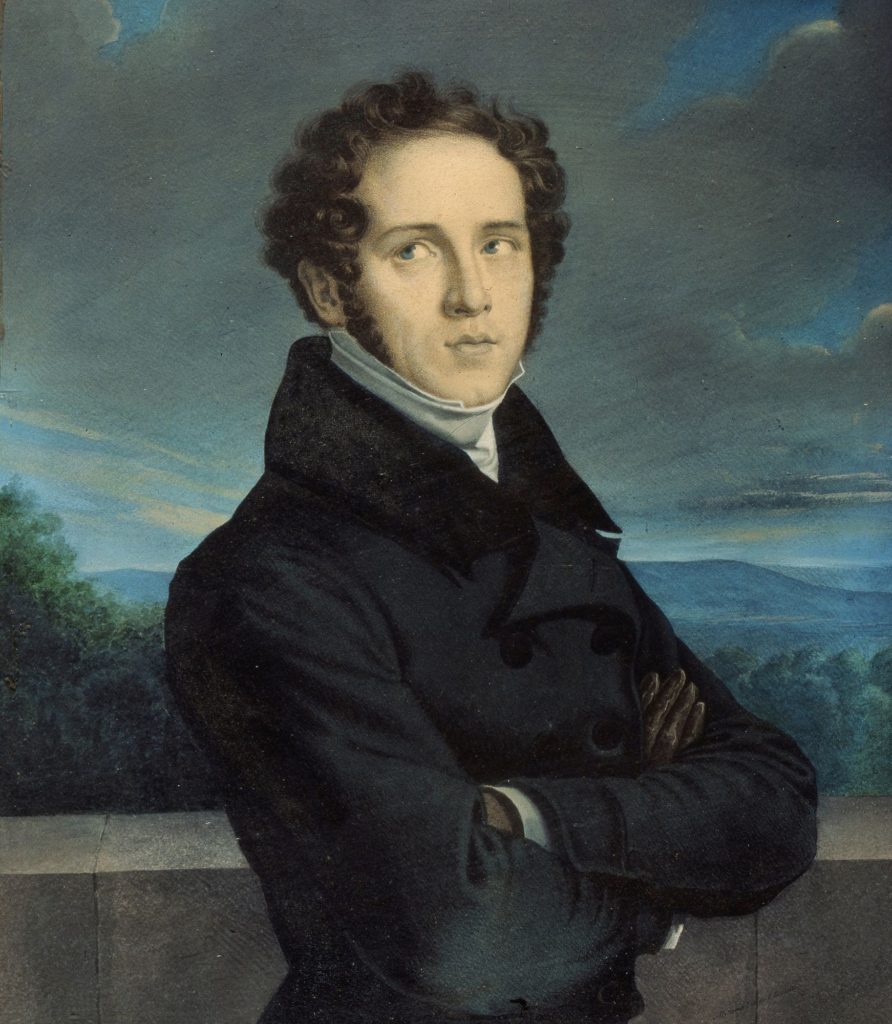Introduction
In this article I would like to tell you about Vincenzo Bellini, born in Catania in 1801 and died in Puteaux, France, in 1835. The very short life of this composer was characterized by the production of authentic masterpieces: he desired to mature the perfection of a small and limited number of works (in a tendency contrary to his colleagues Rossini and Donizetti, forced by the theatrical market to write continuously). But let’s take a step back and find out the reasons behind this risky decision.

Operas
In a previous article that you can find here, we had the opportunity to talk about the figure Rossini: if we consider the catalogue of Bellini’s works, which covers a period ranging from 1825 to 1835, we understand how much the comparison with the composer from Pesaro was inevitable. Rossini is one of the most influential composers of the nineteenth century: his production, especially in his youth, was studded with successes that had important influences on all contemporary composers. As anticipated, Bellini found himself making the difficult decision to continue on the line of prolific composition or resize his writing given a poor production. The outcome of this decision was manifested in an unprecedented melodic elegance, the result of continuous work of accurate and intimate refinements to be admired by those composers previously not particularly favourable to the aesthetics of Italian theatre: from Wagner to Chopin, Bellini’s melody was the object of great inspiration. Fact, the latter, which clearly distinguished the production of the composer from Catania from the contemporary Rossini and his rival Donizetti. But Bellini was not always a composer of a cautious pen: to understand the nuances (and exceptions) that run through Bellini’s production, we should observe in extreme synthesis the historical-biographical events that surround his three main works.
The Sleepwalker
On the occasion of the production of the first of his major works, La Sonnambula, a rapid succession of adverse events pushed the composer Vincenzo Bellini to cancel the planned recording of Ernani’s libretto in (1830) due to censorship; the first was scheduled for 1831, there were less than two months available to find an alternative. Felice Romani (1788-1865), Bellini’s then librettist, opted for the solution of the fastest realization and that required the least possible retouching of the text: he opted for the novel La Sonnambule by Eugène Scribe, an opera defined as semi-serious as it borrowed only the happy ending of the opera buffa, but retained tragic characters (although not particularly marked). The presence of the soprano Giuditta Pasta in the cast of the world premiere, as well as the later interpretation of Maria Callas, contributed to making this masterpiece immortal.
Norm
Opera in two acts to a libretto by Romani, Norma is undoubtedly the best known masterpiece of the composer from Catania. The clear classical allusions to the myth of Medea are flanked by the compositional idea of an orchestra that has the role of filling and accompanying the main voice. Also in this case it seems paradoxical that Bellini, under pressure and with short time available, manages to give the best of himself (although, as we have said, it was not his tendency). He produced this work in just over two and a half months, and also in this case the first sees Giuditta Pasta soprano in the cast. The initial flop, due in large part to the presence of organized groups of spectators who disagreed for rivalry with both Bellini and the soprano Pasta, was followed by the successful work that we know today and which over time has brought Norma to the absolute top, of popularity, of Bellini’s production. Famous cantabile from the cavatina Casta Diva.
Given the difficulty of Bellini’s scores, we remind you that if you want to deepen your musical analysis, reading of music and your compositional skills, there is our special individual online course: you can find the program in the section of the online courseonline courses section > the course program, or book an individual lesson online by consulting the availability calendar directly here.
The Puritans
Of this “trilogy” of Bellini’s greatest masterpieces, I Puritani, the last opera in three acts by the composer from Catania is the only work of the “trilogy” that we have explored which does not have a libretto by Romani. In fact, Carlo Pepoli (1796-1881), a rather inexperienced librettist, drew from the historical drama by Jacques-François Ancelot and Joseph Xavier Boniface Têtes rondes et Cavaliers the libretto for the opera by the composer from Catania. Bellini will follow Pepoli closely, guiding him in his work, given his lack of experience. In contrast with the two previous works, I Puritani was conceived in a period of time as long as a pregnancy: nine months, a time inconceivable by the compositional standards of the time, where an opera could be composed even within fifteen days (think of the score for Chiara and Serafina by Donizetti). The first performance of the opera at the Théâtre Italien in Paris (1835) was a real triumph.
Conclusions
For today’s article we stop here: continue to follow us, on a next page we will continue this very interesting speech, analyzing in detail scores similar to those of Bellini in the Musical Analysis section. You can subscribe to the e-mail form to not miss the next updates and receive a notification at each new publication: see you in tomorrow’s article!
- History Of The Piano – The Fortepiano - July 12, 2022
- Curt Sachs – History Of Organology At a Glance - July 8, 2022
- Giuseppe Verdi – Rigoletto, Il Trovatore, La Traviata - June 29, 2022
